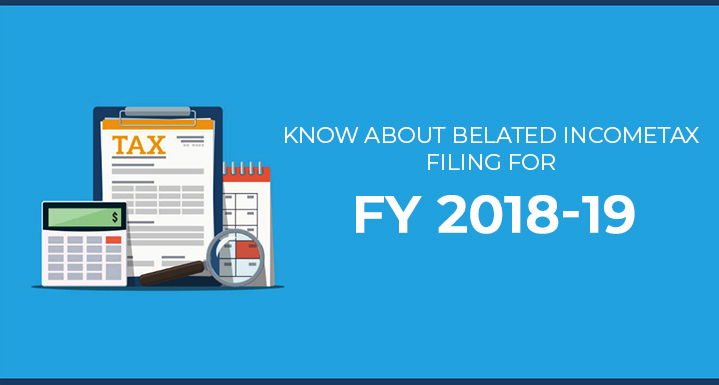If you have missed filing your income tax return before the extended deadline, don’t worry—you still have a chance to do so. An income tax return filed after the extended deadline is called a ‘Belated Return’. However, there are a few aspects you have to note before you use this last chance (Belated Return).
This date is now reduced by 3 months to 31st December of the assessment year, as against the previous due date of the end of the assessment year. Hence, the due date for filing the belated return for FY 2020-21 would be 31st December 2021.
Belated Income Tax Return
If an individual or any taxpayer fails to file their Income Tax Return on or before the due date, then under the section 139(4) of the Income-tax Act, he can file after the due date and it termed as belated return.
Deadline to file a belated Income Tax Return
You can file a belated return any time before the end of the applicable year or before the completion of the assessment, but earlier is better. If you are filing a belated return for the Financial Year 16-17, then you have to fill the applicable Income Tax Returns as advised for the same Financial Year and not for any other year’s ITRs (previous or later FY). An individual can file the belated return for Financial Year Y2018- 19 by or before March 31, 2020, that is, before the end of the current assessment year AY2019- 200).
According to the amendments in the Finance Act of 2017, an individual or any taxpayer who is filing a belated return needs to pay their penalty. As per this rule, any individual or any taxpayer who files a belated return has to pay a penalty to the income tax department. The deadline to file your income tax return for the 2018-19 financial year was 31 August 2019. If you fail to file your ITR on time, then it will result in a penalty for late filing of the income tax return. It will lead to a few other consequences and inconveniences, which you have to understand due to the delay. Let us discuss all these in detail below.
Penalty for Late Filing
According to the updated rules of the Income Tax Act, section 234F notifies that if you file your Income Tax Return after the deadline, then you are liable to pay a maximum penalty of Rs 10,000, and this rule came into effect on 1 April 2017. To make it clear, if you file ITR after 31 August but before December of the same year, then you are liable to pay a penalty of Rs 5000. For income tax returns that are filed after December of the same year, the penalty amount will be increased to Rs 10,000. And, there is somewhat good relief for small taxpayers. Yes, the IT department has notified that if the total income of the taxpayer is not more than Rs 5 lakh, then the maximum penalty charged for their ITR delay will be Rs 1000.
Reach Kanakkupillai for Hassle-free Income Tax Return Filing In India
Email: support@kanakkupillai & Phone: 7305 345 345
Belated Return Penalty Details
| Income Tax Return E- E-Filing Date | Total income below Rs 5,00,000 | Total income above Rs 5,00,000 |
| 31st August 2019 | Rs 0 | Rs 0 |
| Between 1st Sep 2019 to 31st Dec 2019 | Rs 1,000 | Rs 5,000 |
| Between 1st Jan 2020 to 31st March 2020 | Rs 1,000 | Rs 10,000 |
Time for Editing Your Return
As per the changed rules, the time for editing your ITR has been reduced, say, for example, if you are filing your Income Tax Return with a mistake, you have time only till the end of the relevant Assessment year to edit your ITR (for ITRs from FY 2017-18). Before, this rule was not there, and the taxpayers had about a 2-year-long window to edit or change and resubmit the ITR without any mistakes. This has been reduced now to one year from the end of the FY. Therefore, it means that the earlier you file your ITR, the longer the window will be available for you to edit your ITR to correct any errors, if any.
Interest for Late Filing
If you fail to file your income tax returns on or before the due date, you are liable to pay interest at the rate of 1% for part of a month or every upcoming month on the amount of income tax which is unpaid under section 234A. Therefore, it is important to understand that any individual’s ITR cannot be filed if he has any unpaid tax amount. The calculation of the penalty for ITR will start soon after the due date, i.e., from 31 July, and for the current year, i.e., FY 2018-19, the date is from 31 August 2019. So, it is clear that the longer you hold back, the greater the penalty you have to pay.
Carry Forward of Losses is not allowed.
If the taxpayer has suffered any losses during the year, say, any loss in your business or a loss under the head Capital Gains, make a point that you file your IT return before the due date. If not, the return filer is not permitted to carry forward these losses even after paying all taxes in time.
Delayed Refunds
Just in case you are eligible to receive a refund from the income tax department for paying the excess amount of taxes, you need to file your income tax return before the due date to get the refund as soon as possible.





